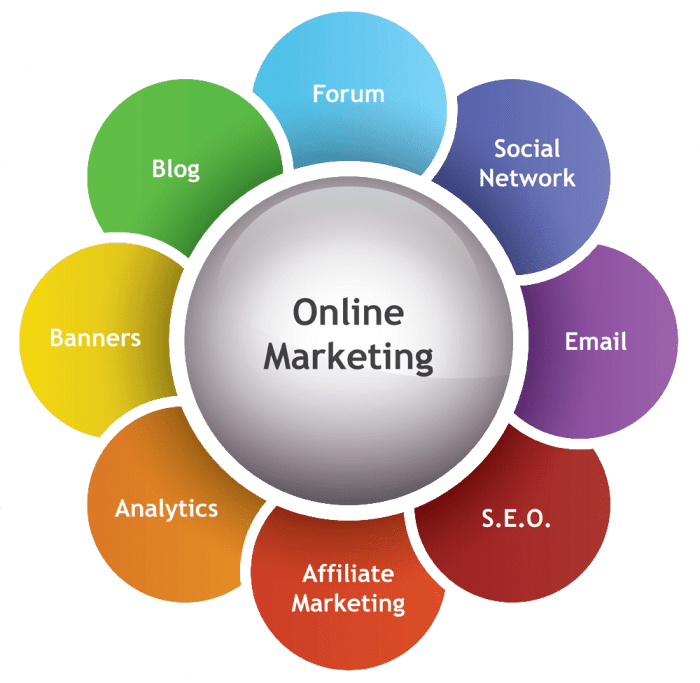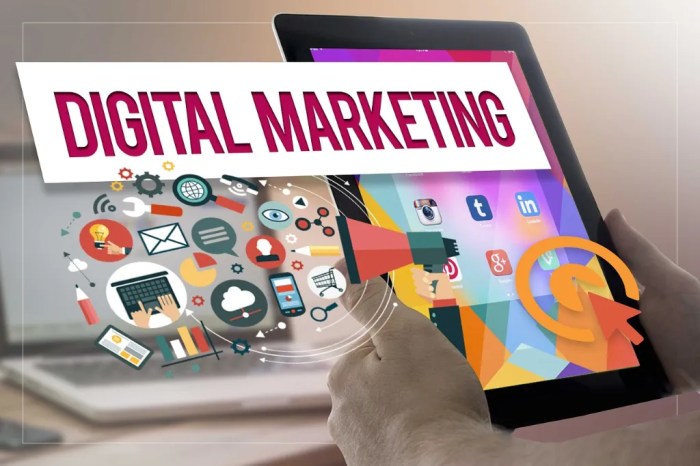Online Business Marketing sets the stage for this enthralling narrative, offering readers a glimpse into a story that is rich in detail with American high school hip style and brimming with originality from the outset.
In the world of online business marketing, strategies play a crucial role in driving success and growth. From to social media, the digital landscape offers endless opportunities for businesses to thrive and connect with their target audience.
Importance of Online Business Marketing
In today’s digital age, online business marketing plays a crucial role in the success and growth of a business. With the increasing use of the internet and social media platforms, businesses need to establish a strong online presence to reach a wider audience and stay competitive in the market.
Examples of Successful Online Marketing Strategies
- Search Engine Optimization (): By optimizing website content and structure, businesses can improve their visibility on search engines and attract more organic traffic.
- Social Media Marketing: Leveraging platforms like Facebook, Instagram, and Twitter to engage with customers, promote products/services, and build brand awareness.
- Email Marketing: Sending personalized and targeted emails to subscribers to nurture leads, drive sales, and build customer relationships.
- Content Marketing: Creating and sharing valuable content such as blogs, videos, and infographics to educate, entertain, and engage the target audience.
Impact of Effective Online Marketing on Business Growth
Effective online marketing can lead to significant business growth by increasing brand visibility, attracting more website traffic, generating leads, and driving sales. By engaging with customers online and providing value through various digital channels, businesses can build a loyal customer base and achieve long-term success in the digital landscape.
Strategies for Online Business Marketing

In today’s digital age, having effective online marketing strategies is crucial for the success of any business. By utilizing various tools and techniques, businesses can reach a wider audience, increase brand visibility, and ultimately drive more sales. Let’s explore some essential online marketing strategies that can help businesses thrive in the competitive online landscape.
Importance of
, or Search Engine Optimization, is a vital component of online marketing. By optimizing your website and content for search engines, you can improve your visibility in search results and attract more organic traffic. With the right strategies, you can increase your website’s ranking, drive targeted traffic, and ultimately boost your online presence.
Social Media Marketing
Social media platforms have become powerful marketing tools for businesses of all sizes. By creating engaging content, interacting with followers, and running targeted ads, businesses can reach a vast audience on platforms like Facebook, Instagram, Twitter, and LinkedIn. Social media marketing allows businesses to build brand awareness, engage with customers, and drive traffic to their websites.
Email Marketing
Email marketing remains one of the most effective ways to connect with customers and drive conversions. By sending personalized and targeted emails to subscribers, businesses can nurture leads, promote products or services, and build lasting relationships with customers. Email marketing allows businesses to deliver valuable content directly to their audience’s inbox, keeping them engaged and informed.
Content Marketing
Content marketing plays a crucial role in enhancing online visibility and attracting leads. By creating high-quality and relevant content, businesses can establish themselves as industry experts, drive organic traffic to their websites, and engage with their target audience. Whether through blog posts, videos, infographics, or podcasts, content marketing helps businesses connect with customers and build brand credibility.
Leveraging Social Media for Business Marketing

In today’s digital age, social media has become a powerful tool for businesses to reach their target audience, build brand awareness, and drive sales. With millions of users actively engaging on platforms like Facebook, Instagram, Twitter, and LinkedIn, businesses have the opportunity to connect with their customers on a more personal level and create a loyal following.
Role of Social Media Platforms in Online Marketing
Social media platforms play a crucial role in online marketing by providing businesses with a direct channel to communicate with their audience. These platforms allow businesses to share content, engage with customers, run targeted ads, and gather valuable insights into consumer behavior. By leveraging social media, businesses can increase brand visibility, drive website traffic, and ultimately boost sales.
- Facebook: With over 2 billion monthly active users, Facebook is a great platform for businesses to connect with a diverse audience through posts, ads, and live videos.
- Instagram: This visually-focused platform is ideal for businesses in the fashion, beauty, and lifestyle industries to showcase products and engage with a younger demographic.
- Twitter: Known for its real-time updates and trending hashtags, Twitter is perfect for businesses looking to share news, updates, and engage in conversations with their audience.
- LinkedIn: As a professional networking platform, LinkedIn is essential for B2B businesses to connect with industry professionals, share thought leadership content, and generate leads.
Creating Engaging Social Media Content
To create engaging social media content, businesses should focus on creating visually appealing posts, using relevant hashtags, posting consistently, engaging with their audience, and leveraging the power of user-generated content. By providing value to their followers, businesses can build a loyal community and increase brand awareness.
- Use high-quality images and videos to grab the audience’s attention.
- Ask questions, run polls, and encourage comments to spark conversations with your followers.
- Craft compelling captions that tell a story and resonate with your audience.
- Celebrate milestones, share behind-the-scenes content, and showcase user testimonials to humanize your brand.
Benefits of Influencer Collaborations in Social Media Marketing
Influencer collaborations can be highly beneficial for businesses looking to expand their reach, build credibility, and drive conversions. By partnering with influencers who have a loyal following in your target market, businesses can tap into their influence, leverage their credibility, and reach a wider audience.
- Increased brand visibility and awareness among the influencer’s followers.
- Access to a targeted audience that aligns with your brand values and product offerings.
- Authentic recommendations and endorsements from trusted influencers can build credibility and trust with potential customers.
- Opportunities for creative collaborations, content creation, and partnerships that can drive engagement and conversions.
Email Marketing Best Practices
Email marketing is a powerful tool for businesses to connect with their audience, build relationships, and drive sales. To run a successful email marketing campaign, there are key elements that need to be considered.
The Importance of Personalization
Personalization is crucial in email marketing as it helps to create a more tailored and relevant experience for subscribers. By addressing recipients by their name and sending targeted content based on their preferences and behavior, businesses can increase engagement and conversion rates.
- Segmentation: Divide your email list into smaller segments based on demographics, purchase history, or engagement level to send more personalized and targeted messages.
- Dynamic Content: Use dynamic content to customize the email content for each recipient, delivering relevant information that resonates with their interests.
- Automation: Implement automated email workflows triggered by specific actions or events to deliver timely and relevant messages to subscribers at the right moment.
Effective Email Marketing Strategies
Businesses can adopt various strategies to optimize their email marketing campaigns and achieve better results.
- Clear Call-to-Action (CTA): Include a clear and compelling CTA that prompts recipients to take action, whether it’s making a purchase, signing up for a webinar, or downloading a resource.
- A/B Testing: Test different elements of your emails, such as subject lines, content, or send times, to identify what resonates best with your audience and optimize your campaigns accordingly.
- Mobile Optimization: Ensure that your emails are mobile-responsive to provide a seamless experience for subscribers accessing their emails on smartphones and tablets.
Importance of Website Optimization
Website optimization plays a crucial role in the success of online marketing efforts. By ensuring that your website is optimized for search engines and user experience, you can attract more traffic, engage visitors, and convert leads into customers effectively.
Significance of Mobile Optimization
Mobile optimization is essential in today’s digital landscape, as more and more users access websites through their smartphones and tablets. By optimizing your website for mobile devices, you can provide a seamless and user-friendly experience for visitors on the go. This not only improves user satisfaction but also boosts your search engine rankings, as Google prioritizes mobile-friendly websites in search results.
- Implement responsive design to ensure your website adapts to different screen sizes.
- Optimize images and videos for faster loading times on mobile devices.
- Prioritize mobile-friendly navigation for easy browsing on smaller screens.
- Ensure that forms and calls-to-action are easily accessible and functional on mobile.
Tips for Improving Website User Experience, Online Business Marketing
Enhancing website user experience is key to driving conversions and maximizing the impact of your online marketing efforts. By focusing on usability, accessibility, and engagement, you can create a positive impression on visitors and encourage them to take action on your website.
- Streamline navigation to make it easy for users to find what they’re looking for.
- Optimize page load speed to reduce bounce rates and improve user satisfaction.
- Create clear and compelling calls-to-action to guide visitors towards conversion points.
- Ensure that content is well-organized, relevant, and easy to consume.
